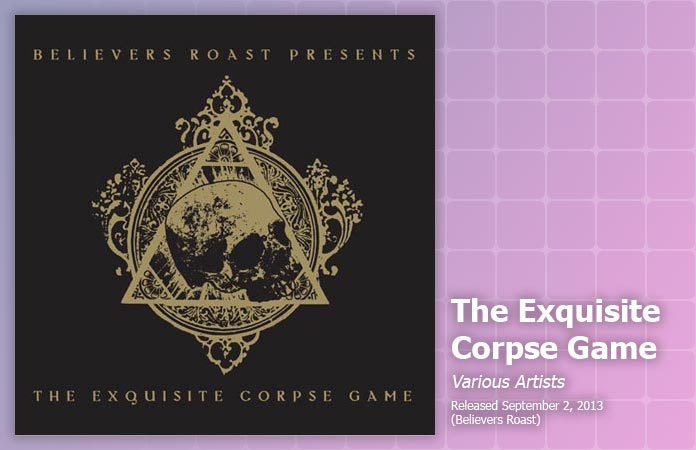Music Review: Various Artists, The Exquisite Corpse Game
Published on September 19th, 2013 in: Current Faves, Music, Music Reviews, Reviews |I first head the term “Exquisite Corpse” in the Bauhaus song of the same name, but I didn’t know what it meant or about its history. Popularized by the Surrealists, it is “a method by which a collection of words or images is collectively assembled. Each collaborator adds to a composition in sequence, either by following a rule or by being allowed to see only the end of what the previous person contributed” (Wikipedia).
This method seems perfect for a variety of artistic collaborations, particularly music, where it can be utilized to create a textured mixtape quality. Musician Kavus Torabi decided to embark on an exquisite corpse project through his own label, Believers Roast, and the results—two years in the making—are remarkable and intoxicating. Each artist was only allowed to hear the final 20 seconds of the previous installment and was not allowed to hear the entire collection until it was completed.
Khyam Allami introduces the album with “Fold 1.” (Each piece on the album has been named after the physical art version of an exquisite corpse, in which the paper is folded to conceal all or part of the previous artist’s contribution.) The oud (a traditional Middle Eastern stringed instrument) combines with a stylophone to create a swirling, repetitive series of sounds that draw the listener in immediately.
The shift from Allami’s music into that of Karda Estra’s is subtle but is felt subconsciously. Female singers join in with additional instruments such as bells and reverbed guitar to create something reminiscent of Alain Gorauger’s La Planète sauvage score without actually sounding like the score at all. Karda Estra founder Richard Wileman also plays the bouzouki (another stringed instrument, this one from Greece) and there are hints of it in this composition.
There is a mystical quality in the outro from Karda Estra that blends so perfectly with JG Thirlwell’s contribution that I feel Wileman should collaborate with Thirlwell as soon as possible on a full-length release. Soon, a multiplicity of instruments make themselves known: drums, timpani, bells, eerie synthesizers, deep, ghostly voices, and other orchestrated flourishes, with the result feeling similar to Steroid Maximus.
Next is Kavus Torabi’s own addition to the corpse, which opens with what could be a cuatro or mandolin and then adds bass and guitar. It soon introduces handclaps and drums (and possibly a dulcimer), which along with the odd time signatures, makes the piece sound similar to early-’80s King Crimson.
The following two contributions are my favorite on the entire album. British Theatre’s piece starts off almost non-descript before slow drums and bass are added. A sinuous, haunting melody sneaks in quietly before eventually overtaking the other instruments and filling your ears with sound. It’s incredibly minimalist and terrifically effective in creating a sense of unease and yearning.
Bob Drake’s stark, melancholy violin is an abrupt change from the British Theatre piece but it works beautifully. This is the melody that will stick in your head long after the album ends. There’s another masterful transition into the Weasel Walter contribution that soon becomes creepy and cluttered. It’s one of the more jarring selections, even as it repeats and then deconstructs Drake’s previous melody.
The extremely repetitive beat in Dominique Leone’s piece soon gives way to a bit of comic relief as he addresses a non-existent live audience before veering into solo piano. It’s a strange, but lighthearted addition. It ends with a sustained note that meshes with the heavily synthesized contribution from Appleblim that, despite not sounding like anything previous on the album instrument-wise, fits from a melodic standpoint.
Katharine Blake’s piece is the shortest at slightly over a minute, but it’s no less intriguing. There are multi-tracked vocalizations over reed instruments which somewhat recall the Bob Drake segment. I wish it were longer, especially since the Max Tundra contribution is underwhelming until it finally gets interesting at the end. By far my least favorite is the Mikrokosmos section, which comes across as being obnoxious for its own sake and not adding anything worthy to the mixture.
Thankfully, the album ends on an amazing note, literally, with Craig Fortnam’s lyrical contribution, sounding like riding in a car at sunset when the light creates patterns on the air.
The Exquisite Corpse Game is such an original concept for a musical production that I hope other artists follow its example. Despite a few pieces that I don’t care for, overall it’s a worthy endeavor and a rewarding listen.
The Exquisite Corpse Game was released by Believers Roast on September 2.

Time limit is exhausted. Please reload the CAPTCHA.